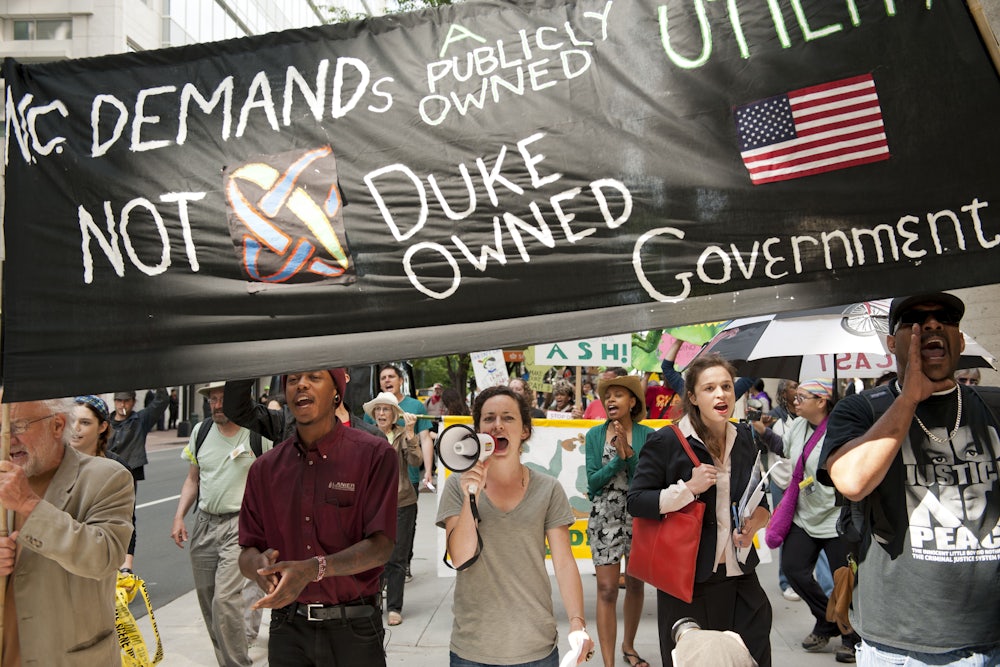For the vast majority of North Carolina’s 10 million–plus residents, there is only one option if they’d like to heat their home, turn on the lights, or charge their phone: Duke Energy. The largest investor-owned electric utility in the nation, Duke operates an effective monopoly on energy in the state, while also supplying natural gas and coal-generated electricity to customers (or hostages, if you’re feeling particularly spicy) across the nation.
On Monday, North Carolina Attorney General Josh Stein announced a settlement agreement between his office, Duke Energy, the Public Staff of the North Carolina Utilities Commission (a state agency that regulates energy corporations like Duke), and the Sierra Club. The deal is meant to partly resolve the coal ash scandals of the past decade, in which pools of toxic leftover materials from Duke’s coal-fired plants either spilled over into major rivers or seeped into the groundwater sources and poisoned nearby communities that use personal wells for their homes. The settlement, Stein’s office proclaimed in its press release and subsequent press conference, would save North Carolina electricity customers $1 billion in the coming decade.
That shouldn’t be seen as a victory. If anything, it’s a call to action. The settlement merely means Duke Energy won’t be able to fleece an entire state’s worth of people who have nowhere else to turn. While Monday’s settlement will certainly soften the blow, North Carolina customers will still shoulder a significant portion of the cleanup costs. In a press conference on Monday, Stein said that the costs through 2030 will be roughly $4 billion, meaning that Duke Energy will take on a quarter of the cost itself, while the remaining estimated 75 percent, or $3 billion, will be passed on to customers. When pressed on why customers should share in the cost at all, Stein offered the following response (emphasis mine):
Coal fired the production of energy and power in North Carolina for decades. We didn’t always know that coal created problems for the environment, and so the customers benefited from the use of these coal power plants and delivering reliable and affordable energy in North Carolina. Had Duke Energy appropriately mitigated the impacts of the coal ash—in lined pits or through excavation, as they’ve reached in the agreement with the [Department of Environmental Quality]—when we believe they knew they should have, then the cost of cleaning up coal ash may have been less. So my argument all along has been that there should be a sharing: Customers benefited from the use of coal ash. It was a necessary by-product of producing the energy from coal. But Duke Energy should also bear some of that cost, because we argue that they mismanaged the mitigation of that coal ash. And that’s what today’s settlement achieves: a sharing of these costs.
The question now—aside from how Stein figures a 75–25 split is even remotely fair—is how North Carolinians ended up this dependent on such a shrewd, pollutant-friendly corporation But this is just capitalism doing its thing.
Duke Energy came to this position of prominence via coal-powered plants and has spent the past decade of coal decline seeking to avoid any and all costs that accompany its toxic fossil fuel of choice. It can get away with foisting these costs onto ratepayers while hauling in a net income of $3.7 billion for the simple reason that it has spent its entire existence swallowing the competition to construct a regional behemoth. Duke consumed Nantahala Power in 1988; merged with PanEnergy in 1997; ate Union Pacific in 1998; bought out Cinergy in 2005; spun off Union Gas in 2006; added Progress Energy in 2012; and in 2016, claimed Piedmont Natural Gas. It went from operating solely in the South to operating also in the Southeast and the Midwest, adding natural gas outfits and nuclear plants, and bolstering its hold on coal.
As the company grew, so too did its carbon footprint. But when you’re talking about these kinds of profit margins and this kind of spread, what the company leaves in its path is pretty much a baked-in business expense. It’s an expense the company is adept at wriggling out of.
The corporation initially tried to dump the costs of cleaning up its 2014 coal ash spill into the Dan River ($477.5 million, to be specific) onto its customers—a request that was partially granted by the Utilities Commission in 2017, which allowed Duke to hike its rates by 25 percent, with a slightly diminished but still insane $232 million price tag. (Remember: This is all to pay for the sloppy handling of materials the company knew full well were toxic.) In January 2020, Duke agreed to a settlement with the Utilities Commission and the Southern Environmental Law Center to remove the coal ash from six unlined ponds in rural communities across the state (including two near my own tribal community). That agreement, like Monday’s, was not a result of corporate goodwill. The state’s Department of Environmental Quality—run at the time by Michael Regan, who will soon head the Environmental Protection Agency for the Biden administration—had ordered Duke to clean up the sites in April 2019, only for the utility to appeal the ruling. The appeal prompted SELC to jump in, which prompted the settlement, which is finally beginning to be carried out.
There’s a clear pattern in this decade-spanning coal ash disaster: Duke pockets billions from a business model that relies on eliminating the competition and proceeding with the toxic extraction and disposal of fossil fuels; surrounding communities either get sick or are barred from using their own groundwater; the state tries, often lazily, to get Duke to mitigate the pollution; Duke whines that doing so is expensive and uses its cadre of attorneys to appeal, appeal, appeal; grassroots groups counter with their own lawsuits; courts or commissions eventually compel Duke to comply. Rinse, wash, repeat.
Meanwhile, companies like Duke can keep stalling and extending the transition to wind, solar, and other clean energy sources. On Monday, the same day as Stein’s announced settlement, the Sierra Club released a detailed report analyzing the activity of the nation’s largest gas and coal energy providers. The idea was to see how committed—in terms of actual planned infrastructure—these companies and corporations are to clean energy. By 2030, Duke Energy’s planned new gas facilities alone will produce nearly eight gigawatts of gas-powered electricity, more than double that of the second-ranking operator, the Tennessee Valley Authority. This is not sustainable.
Due to the fact that many residents in North Carolina have literally no other option for gas or electricity, and a mass power-bill strike would have to be conducted on an immense scale to deter Duke’s natural gas plans, there are limited options in terms of a broader response to Duke’s stranglehold. As Elizabeth Ouzts reported for EnergyNews last year, the current regulatory framework allows Duke to rig the system against any upstart competitors—as one of the only regulated utilities in the state, Duke controls who gets to sell electricity on its grid and is not particularly keen on selling it to third-party solar or wind-powered companies. Even independent solar developers are at a disadvantage, with Duke tacking on fees to make their business untenable by comparison.
Still, the desire to break up Duke Energy is actually something of a bipartisan goal in North Carolina. Conservationists and conservatives alike (to varying degrees) recognize that the costs of depending on an energy producer as committed to archaic coal- and natural gas-based models as Duke is will be exorbitant sooner or later. That expense can come in the form of higher rates; it can be years removed from one’s own life; or it can be the hastening of planetary crisis. Rest assured, the bill is coming.








